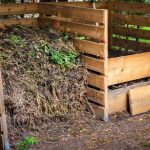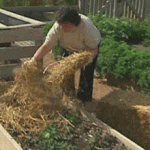Compost and mulch serve different purposes in gardening. Compost is organic matter that has decomposed and is used to improve soil fertility, while mulch is a protective layer placed on top of the soil to retain moisture and control weeds.
Compost adds nutrients to the soil and enhances its structure, making it ideal for enriching gardens and promoting healthy plant growth. On the other hand, mulch helps to conserve moisture, suppress weed growth, and regulate soil temperature.
Both compost and mulch contribute to creating a healthier and more productive garden, but they have distinct roles that fulfill different needs for plants and soil.
So, understanding the differences between compost and mulch is essential for successful gardening.
What Is Compost and What are The Benefits Of Compost?
Compost is a natural, organic material that offers a multitude of benefits for your garden. By recycling organic waste, such as kitchen scraps, yard trimmings, and leaves, composting creates nutrient-rich soil amendment that can significantly improve the health and fertility of your plants.
Let’s explore some of the key advantages of using compost in your garden.
Nutrient-rich Soil Amendment
One of the primary benefits of compost is its ability to enrich soil with essential nutrients. Compost contains a wide array of organic matter, including nitrogen, phosphorus, and potassium, which are vital for healthy plant growth. These essential nutrients are released slowly, providing a continuous supply to your plants. As a result, compost acts as a natural fertilizer, ensuring your plants receive the nourishment they need to thrive.
Improves Soil Structure And Fertility
Another significant advantage of using compost is its ability to improve soil structure and fertility. Compost has a crumbly texture that helps loosen compacted soil, allowing for better root penetration and improved drainage. This improved soil structure creates a favorable environment for roots to grow, leading to healthier and more productive plants. Furthermore, compost helps replenish the soil’s organic matter content, providing a fertile substrate for beneficial microorganisms and earthworms to thrive.
Enhances Moisture Retention
In addition to its nutrient-rich composition and soil-enhancing properties, compost also helps retain moisture in the soil. The organic matter in compost acts like a sponge, absorbing water and slowly releasing it to plant roots as needed. This moisture retention ability is especially beneficial in drought-prone areas or during dry periods when water conservation is crucial. By improving the soil’s water-holding capacity, compost helps reduce the frequency of watering and promotes more efficient use of water resources.
Reduces The Need For Chemical Fertilizers
By incorporating compost into your garden, you can significantly reduce the need for chemical fertilizers. Compost provides a natural and sustainable source of nutrients, eliminating the reliance on synthetic fertilizers that can harm the environment and disrupt the delicate balance of soil ecosystems. The slow-release nature of compost nutrients also prevents the risk of overfertilization, which can burn plants and leach harmful chemicals into groundwater. By choosing compost as a soil amendment, you can ensure the long-term health and productivity of your garden while minimizing environmental impact.

Benefits Of Mulch
Mulch is a valuable addition to any garden or landscape, offering a wealth of benefits. From conserving soil moisture to suppressing weed growth, mulch plays a crucial role in maintaining plant health and achieving a thriving garden environment. Additionally, the use of mulch regulates soil temperature, protecting your plants from extreme weather conditions. Let’s dive into the specific advantages of using mulch in your garden:
1. Conserves Soil Moisture
Mulch acts as a natural barrier between the soil and the environment, reducing moisture loss due to evaporation. By providing a protective layer over the topsoil, mulch helps retain moisture, ensuring that your plants receive the adequate hydration they need to thrive. This is particularly beneficial during dry and hot weather conditions when water scarcity becomes a concern.
2. Suppresses Weed Growth
One of the headaches for gardeners is the constant battle against weeds. Mulch acts as a formidable soldier in the fight against unwanted plants. By forming a physical barrier, mulch prevents weed seeds from germinating and penetrating the soil. This minimizes the need for manual weeding and significantly reduces weed competition for essential nutrients, allowing your plants to flourish without interference.
3. Regulates Soil Temperature
The temperature of the soil plays a vital role in the growth and development of plants. Mulch acts as an insulating layer, helping to regulate soil temperature and protect plant roots from dramatic temperature fluctuations. Whether it’s insulating against scorching heat in the summer or shielding against freezing cold in the winter, mulch offers a buffer that provides a stable and conducive environment for plants to thrive.
4. Protects Plants From Extreme Weather Conditions
Nature can be unpredictable, and extreme weather conditions can wreak havoc on your garden. Mulch provides a layer of protection, acting as a shield against adverse weather elements. It helps to preserve moisture levels during droughts, shielding plants from intense sunlight, and providing insulation during frost or cold spells. By adding a layer of mulch, you can ensure that your plants have a better chance of withstanding harsh weather conditions and bouncing back quickly.
In conclusion, mulch offers a wide array of benefits for your garden. From conserving soil moisture and suppressing weed growth to regulating soil temperature and protecting plants from extreme weather conditions, mulch is an invaluable tool for promoting healthy and vibrant plant growth. By incorporating mulch into your gardening routine, you can reap the rewards of a flourishing and resilient garden.
Differences Between Compost And Mulch
When it comes to gardening and landscaping, two terms that often come up are compost and mulch. Compost and mulch both play important roles in improving soil health and promoting plant growth, but they have distinct differences in terms of composition, nutrient content, application, and decomposition rate.
Composition: Compost Is Made From Decomposed Organic Matter, While Mulch Can Be Made From Various Materials.
Compost is created through the decomposition of organic matter such as kitchen scraps, yard waste, and manure. Over time, bacteria, fungi, and other microorganisms break down these materials into a nutrient-rich, dark, crumbly substance that can be added to the soil.
Mulch, on the other hand, can be made from a variety of materials including wood chips, straw, grass clippings, leaves, and even rubber. Mulch acts as a protective covering on the soil surface, providing insulation, reducing weed growth, conserving moisture, and preventing erosion.
Nutrient Content: Compost Is Rich In Nutrients, While Mulch Provides Minimal Nutrients.
One of the key differences between compost and mulch is their nutrient content. Compost is often referred to as “black gold” due to its high level of nutrients. It contains essential elements like nitrogen, phosphorus, and potassium, as well as micronutrients needed for plant growth. When added to the soil, compost enriches it and enhances its fertility, providing plants with the necessary nutrition for healthy development.
In contrast, mulch primarily serves as a protective layer for the soil. While it does break down over time and contribute some nutrients, its main function is to regulate soil temperature, reduce moisture loss, and suppress weed growth. Mulch is usually not as nutrient-dense as compost, so it is often used in conjunction with compost to provide a balanced soil environment.
Application: Compost Is Typically Mixed Into The Soil, While Mulch Is Applied On Top Of The Soil.
Compost is usually incorporated into the soil by mixing it thoroughly. This allows the nutrients to be evenly distributed and absorbed by the plant roots. It can be dug into garden beds, added to potting mixes, or applied as a top dressing around established plants.
On the other hand, mulch is spread on top of the soil, forming a protective layer. It is applied around plants, trees, and shrubs to retain moisture, suppress weeds, and regulate soil temperature. When using mulch, it’s important to leave a small gap around the plant stems to prevent moisture-related issues.
Decomposition Rate: Compost Breaks Down Relatively Quickly, While Mulch Decomposes At A Slower Rate.
Compost is actively decomposed organic matter, so it breaks down relatively quickly, typically within a few months. As microorganisms continue to break it down, compost gradually becomes incorporated into the soil, further enriching it with nutrients. Its quick decomposition rate makes it an ideal choice for improving soil structure and fertility.
On the other hand, mulch decomposes at a much slower rate. Over time, it gradually breaks down, providing a slow release of nutrients to the soil. This slow decomposition rate ensures that mulch can provide long-term benefits such as weed control and moisture retention.

When To Use Compost
Compost is a valuable resource that can have a significant impact on the health and productivity of your garden. Knowing when to use compost is essential to make the most of its benefits. Here are three key situations when incorporating compost can make a difference:
Soil Improvement
Adding compost to poor soil can help improve its fertility and structure. When your soil lacks essential nutrients or is heavy and compacted, compost can come to the rescue. Its rich organic matter not only provides a wide range of nutrients but also helps to aerate the soil and improve drainage. By mixing in compost, you create a healthier soil environment that supports the growth and development of plants.
Planting New Gardens
Incorporating compost into garden beds before planting can provide essential nutrients that young plants need to thrive. When starting a new garden, it is crucial to establish a nutrient-rich foundation for your plants. By mixing compost into the soil, you give your plants a head start by providing them with the necessary resources to establish robust root systems and promote healthy growth.
Top-dressing
Applying compost on top of existing soil can improve nutrient availability for established plants. When your garden is already established, it’s important to maintain the health and vitality of your plants. Top-dressing with compost ensures that essential nutrients continuously reach the root systems of your plants. By gently spreading a layer of compost over the soil surface, you provide a slow-release source of nutrients that can be absorbed by the plants over time.
When To Use Mulch
Applying a layer of mulch can suppress weed growth and reduce the need for manual weeding. Mulch acts as a barrier, preventing weed seeds from germinating and reaching the surface of the soil.
- Keeps the soil shaded, inhibiting weed growth
- Blocks sunlight, preventing weed seed germination
- Reduces competition between weeds and plants for nutrients and water
Mulch helps to conserve soil moisture, reducing the frequency of watering. By acting as a protective layer, mulch prevents water evaporation from the soil surface.
- Keeps the soil moist for longer periods
- Prevents water runoff and erosion
- Reduces the need for frequent watering
Mulch acts as an insulating layer, protecting plant roots from extreme temperatures. It provides an additional barrier between the soil and the elements, helping to maintain a more stable soil temperature.
- Insulates plants during cold weather, reducing frost damage
- Protects plants from excessive heat during hot summer months
- Helps maintain a more favorable environment for root growth

Credit: slideplayer.com
Frequently Asked Questions Of Compost Vs Mulch
What Is The Main Difference Between Compost And Mulch?
Compost is decomposed organic matter that adds nutrients to soil, while mulch is a protective layer that conserves moisture and suppresses weed growth.
Is Compost Or Mulch Better For Improving Soil Fertility?
Compost is superior for enriching soil fertility as it supplies essential nutrients and improves soil structure, leading to healthier plant growth.
Can I Use Compost And Mulch Together In My Garden?
Absolutely! Combining compost and mulch in your garden provides a multitude of benefits such as improved soil health, water retention, and weed control.
How Often Should I Apply Compost And Mulch In My Garden?
For optimal results, apply compost once or twice a year, while mulch should be replenished every six months to maintain its effectiveness.
Conclusion
When choosing between compost and mulch, it is important to consider their different functions and benefits. Compost enriches soil with nutrients, improving plant growth and health. On the other hand, mulch helps conserve moisture, suppress weeds, and regulate soil temperature.

I am a graduate of Bangladesh Agricultural University, where I delved into various agricultural disciplines, equipping me with a profound understanding of agriculture. Beyond academics, I have hands-on experience in gardening and crop cultivation. My passion is to embrace sustainable farming and horticulture. With a BSc in Agriculture, I am dedicated to promoting environmentally conscious and efficient agrarian practices.
Bachelor of Science (BSc) in Agriculture (Hons.)
Master of Science. (Sustainable Agriculture & Food Security ) (MS)
Bangladesh Agricultural University




